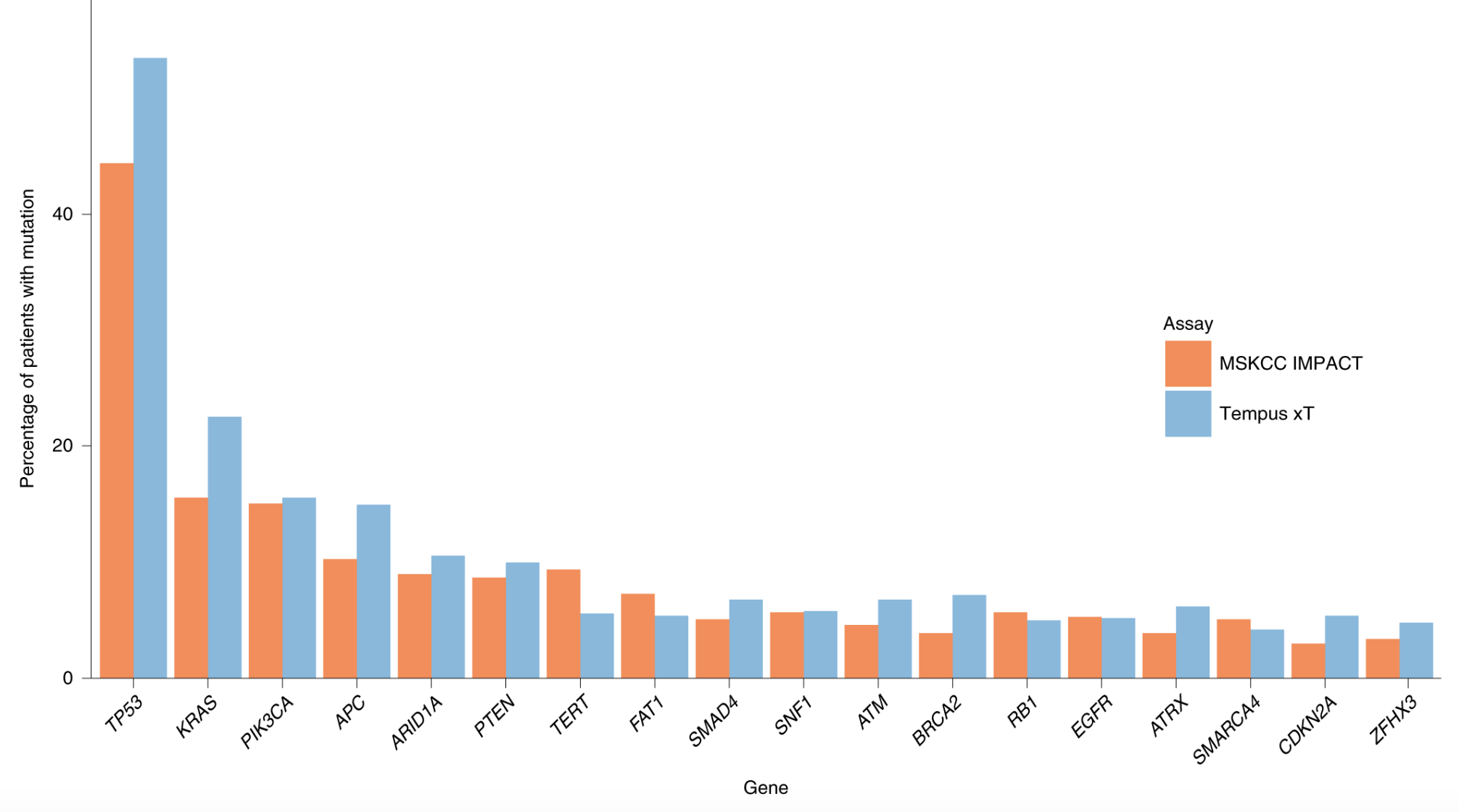November 7, 2019 | Jola Glotzer
Tempus xT platform
CBC Senior Investigator Kevin White, UChicago and Tempus, is senior author on a recent Nature Biotechnology publication which demonstrates the importance of integrated genomic profiling for personalized treatment of cancer patients

CBC Senior Investigator, Kevin White, UChicago & Tempus, is senior author on the Nature Biotechnology publication
In the rapidly advancing field of personalized medicine approaches to cancer treatment, a quick and precise evaluation of a patient’s tumor type and its specific biomarkers is key to the proper assignment of a patient to an existing treatment regime or a clinical trial.
Tempus Labs, a Chicago-based biotech company, is aiming at “making precision medicine a reality.” Tempus scientists have developed an integrated approach to cancer type classification called Tempus xT platform, which analyzes three parameters in parallel in paired tumor-normal samples, DNA-seq, RNA-seq and immunological biomarkers. In a recently published paper in Nature Biotechnology, titled “Comparison of the Tempus xT SNV/indel detection assay against the MSKCC IMPACT study plotted by the prevalence of altered genes commonly known to be hallmarks of cancer,” the Tempus team demonstrates that their technology significantly improves cancer patient matching to personalized therapeutic / clinical study options, outperforming evaluations that are based on tumor sample DNA analysis only.
Kevin White, currently Chief Scientific Officer of biotech start-up Tempus Labs, is senior author on the Nature Biotechnology publication. White was recruited to UChicago in 2006 with the help of a generous CBC Resources Fund Award and was also designated the first CBC Senior Investigator. In addition, he received a CBC Lever Award (2008) for the project: “Chicago Center for Systems Biology (CCSB).” White participated in the CBC Science Day (2011) and the 4th Annual CBC Symposium (2006) on “Infrastructures for Systems Biology.” He also served on the CBC Proteomics Informatics Scientific Board (2007-2009) and the CBC Spark Council (2008-2011). The CBC is grateful for Kevin’s time and dedication serving on CBC boards and for his support of the CBC programs and mission.
Publication linked to *CBC funding:
Beaubier N, Bontrager M, Huether R, Igartua C, Lau D, Tell R, Bobe AM, Bush S, Chang AL, Hoskinson DC, Khan AA, Kudalkar E, Leibowitz BD, Lozachmeur A, Michuda J, Parsons J, Perera JF, Salahudeen A, Shah KP, Taxter T, Zhu W, White KP. Integrated genomic profiling expands clinical options for patients with cancer. Nat Biotechnol. 2019 Sep 30. [Epub ahead of print] (PubMed)
ABSTRACT:
Genomic analysis of paired tumor-normal samples and clinical data can be used to match patients to cancer therapies or clinical trials. We analyzed 500 patient samples across diverse tumor types using the Tempus xT platform by DNA-seq, RNA-seq and immunological biomarkers. The use of a tumor and germline dataset led to substantial improvements in mutation identification and a reduction in false-positive rates. RNA-seq enhanced gene fusion detection and cancer type classifications. With DNA-seq alone, 29.6% of patients matched to precision therapies supported by high levels of evidence or by well-powered studies. This proportion increased to 43.4% with the addition of RNA-seq and immunotherapy biomarker results. Combining these data with clinical criteria, 76.8% of patients were matched to at least one relevant clinical trial on the basis of biomarkers measured by the xT assay. These results indicate that extensive molecular profiling combined with clinical data identifies personalized therapies and clinical trials for a large proportion of patients with cancer and that paired tumor-normal plus transcriptome sequencing outperforms tumor-only DNA panel testing.

Mutational spectrum of the xT 500 cohort. Comparison of the Tempus xT SNV/indel detection assay against the MSKCC IMPACT study plotted by the prevalence of altered genes commonly known to be hallmarks of cancer. (Source: Nat Biotechnol.)
Featured CBC Community member(s):
Kevin White, UChicago
- ▸ CBC Science Day (2011):
Kevin White (UChicago) — Science Day Speaker - CBC Lever Award (2008):
▸ Chicago Center for Systems Biology (CCSB)
PIs: Kevin White (UChicago), Robert Grossman, (UChicago; at UIC then), Richard Morimoto (NU) and Luis Amaral (NU) - Spark Council (SC; 2008-2011):
Kevin White (UChicago) — Council Member - Proteomics Informatics Scientific Board (PISB; 2007-2009):
Kevin White (UChicago) — Board Member - 4th Annual CBC Symposium (2006):
▸ Infrastructures for Systems Biology
Kevin White (UChicago) — Symposium Speaker - *CBC Recruitment Resources Award (2006):
▸ CBC Senior Investigator
Kevin White (UChicago)
ARTICLES PUBLISHED IN THE PAST ABOUT THE FEATURED CBC COMMUNITY MEMBER(S):
October 16, 2019
▸ Enhancer-hijacking in gastric cancer
CBC Senior Investigator Kevin White, UChicago and Tempus, contributes to a recently published study about the role and the type of genomic rearrangements in the pathogenesis of gastric cancer
August 5, 2019
▸ Pathogenesis of sun-protected melanomas
CBC Senior Investigator, Kevin White, UChicago (currently Tempus), investigates genetic heterogeneity of sun-protected melanomas
June 13, 2019
▸ Germline genetic risk variants and carcinogenesis
Kevin White, CBC Senior Investigator, UChicago and President of Tempus Labs, contributed to a recent study in the International Journal of Cancer, which examined associations between germline variants and somatic mutation signatures in breast cancer across a wide range of populations and geographic locations
June 7, 2019
▸ Noncoding RNA and cancer
CBC Senior Investigator, Kevin White, UChicago and Tempus, demonstrates that post-transcriptional editing of noncoding RNA, seen in many types of cancers, may actually play a role in carcinogenesis itself
November 11, 2017
▸ Chicago-based Tempus shows why Midwest healthcare companies drew preferential investment in 2017
November 5, 2017
▸ CBC cancer researchers and Globus will develop a HIPAA-protected cloud database to share collaborative cancer research
February 1, 2017
▸ January 2017 CBC-funded publications
Twenty peer-reviewed research papers acknowledging CBC funding were published in January 2017. Congratulations to all!
March 24, 2014
▸ Study Reveals a Major Mechanism Driving Kidney Cancer Progression
Misplaced protein provides promising drug target
